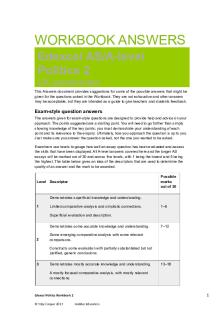Outline Assignment #2- Aristotle’s Politics PDF

| Title | Outline Assignment #2- Aristotle’s Politics |
|---|---|
| Author | Eric Metselaar |
| Course | Social & Political Philosophy |
| Institution | Loyola University Chicago |
| Pages | 2 |
| File Size | 74.5 KB |
| File Type | |
| Total Downloads | 52 |
| Total Views | 140 |
Summary
Madatory Outline #2- Aristotle’s Politics...
Description
Eric Metselaar Philosophy 182 Due: October 4, 2016 Outline #2: Aristotle’s Politics The Claim: "those who contribute the most to this sort of community [of "noble actions"] have a larger share in the city-state than those who are equal or superior in freedom or family but inferior in political virtue, and those who surpass in wealth but are surpassed in virtue" This is therefore a call for a sort of inequality: what is Aristotle's argument for this "unequal" constitution? Steps in Argument: I Early in book 3, Aristotle makes the claim that a citizen is someone who plays a role in public office or the administration of justice, however broadens it to encompass anyone who is entitled to contribute to the legislative or judicial office II This leads Aristotle to pondering the way cities are shaped and asserts that the constitution defines a city and therefore a change in constitution implies a change in the city III This opens the door for Aristotle to differentiate between a good citizen and a good man. A good citizen respects the constitution, while a good person should have perfect virtue, meaning that one might not necessarily be a good person even if they are a good citizen. IV This leads to the distinction between just and unjust constitutions, where the unjust benefit mostly those in power, while the just constitution benefits all of its citizens. However, Aristotle also states that all constitutions are based some notion of justice. V He then elaborates how different constitutions have differing focuses. Elaborating how in oligarchies, citizenship is based on wealth and therefor benefits should be granted in proportion to a citizen’s wealth. However, in a democracy there would be equal distribution of the wealth in the city. VI Aristotle states that this is justified because a city must base its constitution on the end goal of the city, which is not universal. Therefor if cities fixated on wealth and property, the wealthiest member would have to contribute the most and therefor would deserve the greatest share of the benefits. VII However, Aristotle also states that the end goal of the city is not monetary but a good quality life for the good citizens and therefore, just like in the wealthy city, those who contribute the most to inspiring civil responsibility and quality should receive the greatest benefit from the city, implying inequality. Personal Viewpoint: The argument put forth by Aristotle has a very clear and logical flow to it which makes is somewhat hard to refute. It is reasonable that anyone who is the main benefactor of anything should receive the most benefit, at least it conforms business ideals. Furthermore, it is indispensable that this city produces the best citizens, because it conforms with the main goal of the city. This conforms well with my ideology of education, inspiration and life, that focus on rewarding the good deeds rather than penalizing the bad ones. Following this line of thinking, it
is equitable for the major contributors of civil responsibility to receive the highest form of benefit within the city....
Similar Free PDFs

Politics Essay - Assignment 3
- 7 Pages

Outline - assignment
- 2 Pages

Current Events Race & Politics-2
- 3 Pages

Politics Edexcel Workbook 2 Answers
- 43 Pages

Research Outline - ASSIGNMENT
- 4 Pages

Outline #2
- 3 Pages

Assignment-final 2 - Assignment
- 19 Pages

Assignment 2 - Group Assignment
- 27 Pages
Popular Institutions
- Tinajero National High School - Annex
- Politeknik Caltex Riau
- Yokohama City University
- SGT University
- University of Al-Qadisiyah
- Divine Word College of Vigan
- Techniek College Rotterdam
- Universidade de Santiago
- Universiti Teknologi MARA Cawangan Johor Kampus Pasir Gudang
- Poltekkes Kemenkes Yogyakarta
- Baguio City National High School
- Colegio san marcos
- preparatoria uno
- Centro de Bachillerato Tecnológico Industrial y de Servicios No. 107
- Dalian Maritime University
- Quang Trung Secondary School
- Colegio Tecnológico en Informática
- Corporación Regional de Educación Superior
- Grupo CEDVA
- Dar Al Uloom University
- Centro de Estudios Preuniversitarios de la Universidad Nacional de Ingeniería
- 上智大学
- Aakash International School, Nuna Majara
- San Felipe Neri Catholic School
- Kang Chiao International School - New Taipei City
- Misamis Occidental National High School
- Institución Educativa Escuela Normal Juan Ladrilleros
- Kolehiyo ng Pantukan
- Batanes State College
- Instituto Continental
- Sekolah Menengah Kejuruan Kesehatan Kaltara (Tarakan)
- Colegio de La Inmaculada Concepcion - Cebu







